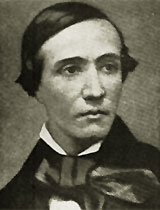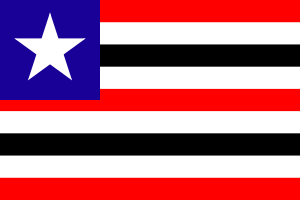Joaquim de Sousa Andrade facts for kids
Quick facts for kids
Joaquim de Sousa Andrade
|
|
|---|---|

A photograph depicting Andrade
|
|
| Born | July 9, 1833 Guimarães, Maranhão, Brazil |
| Died | April 20, 1902 (aged 68) São Luís, Maranhão, Brazil |
| Pen name | Sousândrade |
| Occupation | Poet |
| Alma mater | Sorbonne |
| Literary movement | Romanticism |
| Notable works | Harpas Selvagens, Guesa |
Joaquim de Sousa Andrade, better known as Sousândrade, was a Brazilian poet. He was born on July 9, 1833, and passed away on April 20, 1902. He was part of a poetry style called "Condorism," which focused on freedom and social justice. His poems were very new and different for his time. Today, many people see his work as an early example of Symbolism and Modernism in Brazil.
Sousândrade also designed the flag for the Brazilian State of Maranhão.
A Poet's Life
Sousândrade was born in 1833 in a city called Guimarães, located in Maranhão, Brazil. He published his first book of poems, Harpas Selvagens (which means Wild Harps), in 1857.
Travels and Guesa
Sousândrade traveled to many countries. He went to France, where he studied Linguistics and mining engineering at the Sorbonne. He also lived in the United States starting in 1871. While in the U.S.A., he wrote a very important work called Guesa.
Guesa is an epic poem. This means it's a long poem that tells a heroic story. Guesa is based on a legend from the Muisca people, an Indigenous group. The story is about a teenage boy who is going to be sacrificed to the Sun God.
Sousândrade's Guesa was special because it used many neologisms (newly invented words) and amazing metaphors (ways of describing something by saying it is something else). Because of these new ideas, some experts now believe Guesa was a very early example of Modernism. However, people only truly recognized this many years after Sousândrade's death. From 1871 to 1879, he worked for a newspaper called O Novo Mundo in New York City.
Return to Brazil
After his travels, Sousândrade returned to Maranhão. In 1890, to celebrate the start of the republic in Brazil, he became the president of the mayor's office in São Luís. During this time, he helped start many schools and made changes to education. He also came up with the idea for the flag of Maranhão. He even planned to become a senator in 1890, but he decided not to run before the elections.
Sousândrade passed away in São Luís in 1902. He died poor and mostly forgotten. For many decades, his works were not well-known. But in the 1960s and 1970s, thanks to the efforts of Augusto and Haroldo de Campos, his writings were rediscovered.
Ironically, Sousândrade once said about his poem Guesa in 1877:
People told me more than once that my Guesa Errante will be read only 50 years later [after it was published]. I got sad — a disappointment for someone who wrote it 50 years too early.
Main Works
Here are some of Sousândrade's most important poetry books:
- Harpas Selvagens (1857)
- Guesa (1871)
- Harpa de Ouro (1888/1889)
- Novo Éden (1893)
See also
- List of mayors of São Luís, Maranhão
 | Isaac Myers |
 | D. Hamilton Jackson |
 | A. Philip Randolph |


